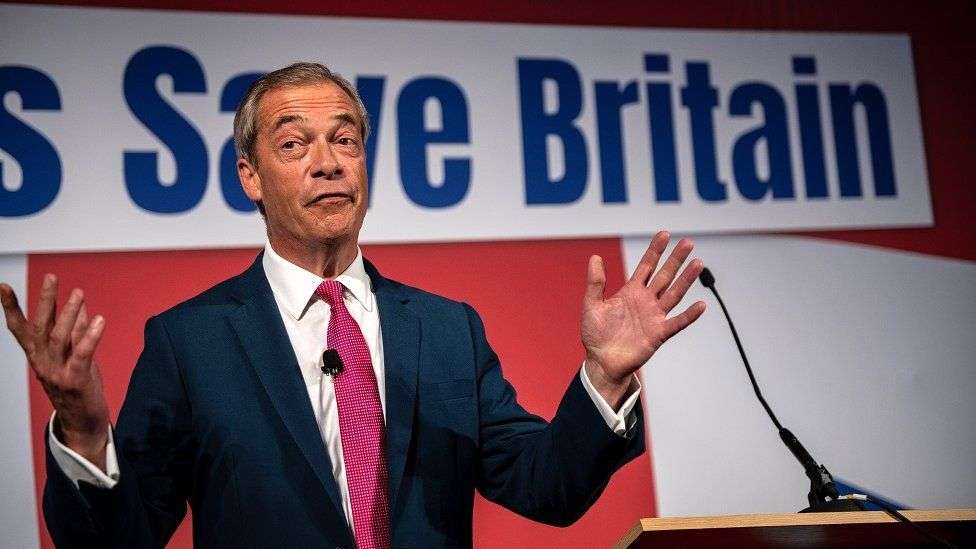UK: Farage blames taxes as wealthy Brits flock to Dubai

Reform UK leader Nigel Farage has urged urgent measures to stem what he calls a growing “wealth and brain drain” from Britain, unveiling a proposal designed to lure back high-net-worth individuals, including those based in the Middle East, according to The National. Speaking at Banking Hall in the City of London on November 4th, Farage warned that the exodus of the United Kingdom’s wealthiest citizens and investors, many of whom have resettled in the Gulf, could trigger economic decline unless government policy changes course.
Farage proposed introducing the “Brittanica card”, which would give wealthy foreigners or British expats 10 years of UK residency for £250,000 and would also grant them favourable tax status, such as immunity from paying taxes on their foreign capital or income.
Farage claimed that thousands of affluent Britons have relocated to low-tax destinations in recent years, particularly Dubai, which is often regarded as a leading global hub for finance, entrepreneurship, and lifestyle. He cited high taxes and growing concerns over safety in London as key reasons for the migration, remarking that “in London, you’re too scared to wear a watch walking down the street.”
The UK has undoubtedly become a less attractive place to invest and do business; however, its poor growth and high inflation are the primary reasons investors and entrepreneurs are looking elsewhere. According to a survey by the Bank of America, the UK is one of the least attractive countries for investors, ranking below bonds, cash, energy and utilities in terms of investment appeal.
The reality is that the UK’s economic growth has been stifled by a reduction in trade post-Brexit, making it an unappealing environment for investors and entrepreneurs. The UK economy is not struggling because a few wealthy individuals, who are scared of getting their watch stolen, decided to move to the neo-liberal fantasy land that is Dubai.
The UK government’s independent official forecaster, the Office for Budget Responsibility (OBR), predicts that in the long run, Brexit will result in a 15% decrease in both imports and exports of goods and services. The results of this are a reduction in the long-term size of the UK economy by around 4% relative to a scenario where the UK stayed in the EU, equivalent to roughly £100bn in today’s money. Other reports suggest that Brexit is costing UK businesses £37 billion annually.
Farage claims that the potential benefits of Brexit have been “squandered” due to poor trade deals, too much regulation and red tape. Brexit was always going to result in more “red tape” and harm to the economy, due to the UK leaving the EU single market and customs union, as this has drastically increased the barriers to entry for businesses. Small businesses have been hit particularly hard by Brexit as they are less able to absorb the financial impact of increased barriers to entry when looking to trade with partners in the EU.
Farage claims to lead a party that is “Pro business and pro-entrepreneurship”, but as the architect of Brexit, as the man who created the UKIP party that cornered David Cameron into bringing about the 2016 referendum, he can be seen as the mastermind of the leave campaign which has led to the UK having one of the worst environments for small businesses in the G7.
Farage also criticised what he described as the Labour government’s “fiscal recklessness,” predicting that its current spending plans would trigger a market crisis and an austerity-style budget by 2027. Reform UK, he said, would instead pursue a fiscally conservative agenda focused on reducing the national debt before implementing tax cuts.

This contradicts his party’s earlier promise to deliver tax cuts worth £90bn a year, which is something that Farage has since had to backtrack on. Farage stated that “given the dire state of debt and our finances,” Reform UK’s previously promised tax cuts “are not realistic at this current moment in time”.
Farage and many others across Britain’s political spectrum, including the current Labour government, cite the UK’s national debt as the reason for continued tax increases and cuts to public services and welfare, claiming that we must “balance the books”.
Although the UK’s national debt is high, currently at 95% of annual GDP, it is nowhere near the highs of the post-WW2 era, where national debt stood at 250% of GDP. At this time, Labour Prime Minister Clement Atlee founded the National Health Service (NHS), nationalised key infrastructure that accounted for roughly 20% of the UK’s economy at the time and did this all while bringing down national debt.
The current political establishment is too scared of its billionaire donors to implement a wealth tax; instead, it’s easier to slowly tighten the tax burden on working-class individuals at an incremental pace so that they don’t even realise they are being strangled.
As Reform UK continue to surge in the polls, it looks as though the professional conman known as Nigel Farage is once again paving his way to success through false promises, disinformation and the popularisation of fear.
The National, OBR, The Independent, BBC News, Business Matters Magazine, Statista, Gov.UK, Maghrebi.org
Want to chase the pulse of North Africa?
Subscribe to receive our FREE weekly PDF magazine










